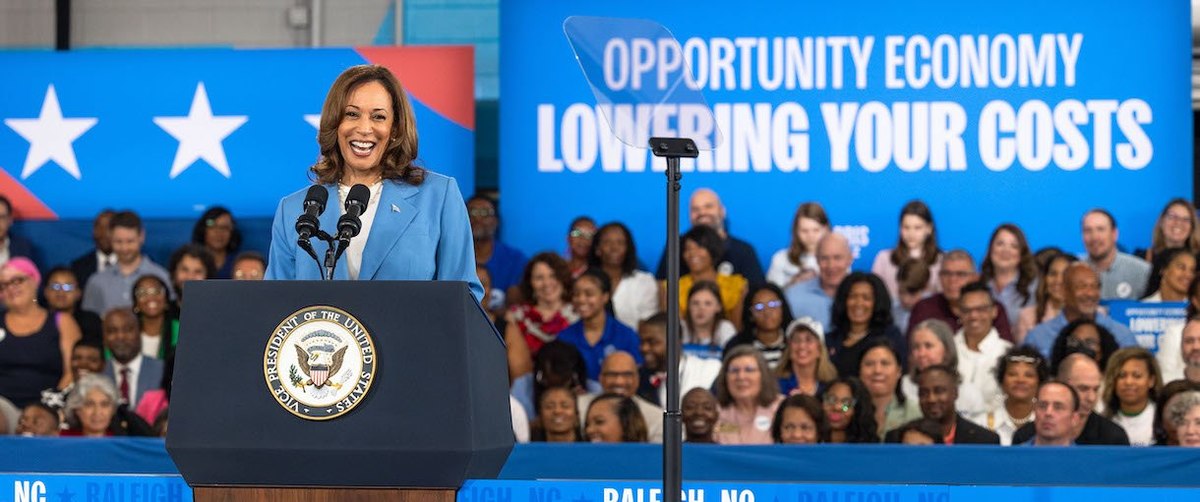Vice President Kamala Harris' economic policy agenda — announced at a campaign rally last week — is largely popular among Americans, new polling finds. The platform is focused on policies aimed at cutting Americans' living costs, primarily for housing, health care, and food. Many Harris proposals are bipartisan, receiving support from majorities of both Democrats and Republicans.
In a poll conducted just after Harris announced her economic agenda, we found that each of the 17 policies asked about is strongly or somewhat supported by at least half of Americans. The largest share to oppose any policy is just 27%.
The most popular components of the platform concern health care — more specifically, drug costs. These include plans to increase the number of drugs eligible for Medicare price negotiations (82% support), cap the monthly cost of insulin at $35 (78%), and cap out-of-pocket annual expenses for prescription drugs at $2,000 (72%).
Harris' proposal to expand the Earned Income Tax Credit for lower-wage workers is supported by 73% of Americans. Restoring the pandemic-era child tax credit of $3,600 per child is supported by a smaller majority — 59% — as is her idea to provide a $6,000 child tax credit to families with babies under one year.
Housing policies included in Harris' agenda are also popular — although somewhat less so than her ideas around health care. 63% are in favor of expanding a tax credit for housing developers building affordable rental units, and 62% favor preventing landlords from using algorithmic price-setting tools.
Between 53% and 59% support removing tax benefits for investors who buy single-family rental homes in bulk, increasing federal investment toward local efforts to address housing shortages, providing a tax credit for developers building homes sold to first-time homebuyers, providing $25,000 in down payment assistance for first-time home buyers, and directing the federal government to work with industry to build 3 million new homes in the next four years.
Perhaps the most ambiguous proposal included in Harris' agenda is related to food costs. In her speech announcing it, she proposed "the first-ever federal ban on price gouging on food," a plan that observers have interpreted in a variety of ways. Our survey asked about "capping increases on food and grocery prices," which we find is supported by 65% of Americans.
Harris' economic policy agenda resonates more with Democrats than Republicans, though certain plans draw support from both sides of the aisle. More than half of Democrats are in favor of each proposal polled from Harris' plan, with support ranging from 72% to 89%. At least half of Republicans support 9 of the 17 proposals, with support ranging from 28% to 81%.
The most divisive policy is extending subsidies for the Affordable Care Act: 80% of Democrats and 27% of Republicans say they support it.
Most Democrats (75%) and Republicans (64%) support maintaining the Federal Reserve’s independence — a policy that Harris supports and Trump has waivered on.
Another survey of 27,579 U.S. adults conducted just after Harris' policy speech found that more Americans think she would be more likely than Donald Trump to lower health care than think he would be (44% vs. 34%), and the same is true for housing costs (40% vs. 36%). On who would be more likely to lower food costs, the two are nearly tied: 39% say Harris and 38% say Trump.
Related:
- Harris gains ground against Trump on the handling of key issues
- Finding common ground: 109 national policy proposals with bipartisan support
- What Americans think about crime and Kamala Harris' approach to it
- Who wins on policy? American support for Biden's and Trump’s proposals
— Carl Bialik contributed to this article
See the results for this YouGov poll
Methodology: This poll was conducted online on August 16 - 19, 2024 among 1,143 U.S. adult citizens. Respondents were selected from YouGov’s opt-in panel to be representative of adult U.S. citizens. The sample was weighted according to gender, age, race, education, 2020 election turnout and presidential vote, baseline party identification, and current voter registration status. Demographic weighting targets come from the 2019 American Community Survey. Baseline party identification is the respondent’s most recent answer given prior to November 1, 2022, and is weighted to the estimated distribution at that time (33% Democratic, 31% Republican). The margin of error for the overall sample is approximately 4%.
Image: Getty










